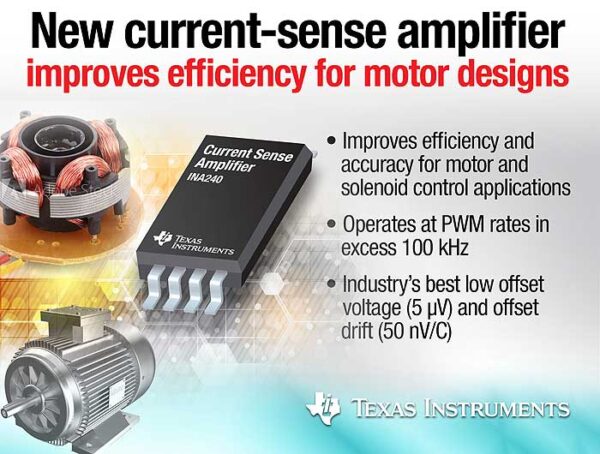 Texas Instruments (TI) introduced a new current-sense amplifier for in-line motor phase current measurement that improves overall motor efficiency, compared to existing current-sense amplifiers. The INA240 offers enhanced pulse-width modulation (PWM) rejection for systems running at up to 80 V to support a variety of applications such as motor control, solenoid control and power delivery systems. For more information about the new current-sense amplifier or to order samples, see www.ti.com/INA240-pr-eu.
Texas Instruments (TI) introduced a new current-sense amplifier for in-line motor phase current measurement that improves overall motor efficiency, compared to existing current-sense amplifiers. The INA240 offers enhanced pulse-width modulation (PWM) rejection for systems running at up to 80 V to support a variety of applications such as motor control, solenoid control and power delivery systems. For more information about the new current-sense amplifier or to order samples, see www.ti.com/INA240-pr-eu.
Key features and benefits
- Enhanced PWM rejection for improved motor efficiency: The presence of high-speed in-line PWM motor control systems requires high AC and DC accuracy. The INA240’s enhanced PWM rejection improves transient suppression and gives designers the ability to reduce their blanking time, optimize the motor-control algorithm and ultimately improve motor efficiency.
- Flexible for a variety of motor applications: The INA240 operates at PWM rates in excess of 100 kHz, with switching-edge rates as high as 10 V/ns while enabling system voltages as high as 80 V. In addition, to address the needs for a wide range of systems, this device supports the negative voltages (-4 V) induced by the inductive kickback of the motor.
- Industry-leading performance and accuracy: The INA240 has the industry’s best combination of low offset voltage (5 µV), offset drift (50 nV/°C), gain error and drift performance (0.05 percent and 0.5 ppm/°C, respectively). The device also provides an excellent AC common-mode rejection ratio (CMRR) of 93dB at 50 kHz. The INA240 delivers performance over a wide range of operating conditions.
- Enhanced performance for any motor-control solution: The INA240’s precision is showcased in a 48-V 10-A In-Line Three-Phase High-Frequency Gallium Nitride (GaN) Inverter for Brushless Motors Reference Design. This BoosterPack™ plug-in module reference design is paired with a C2000™ LaunchPad™ kit, demonstrating how designers can use the INA240 and LMG5200 GaN half-bridge power stage to reduce switching losses over an extended temperature range up to 125°C, facilitate the use of higher PWM frequencies and reduce heat sinking requirements.
Support is available in the TI E2E™ Community Current Sensing forum, where engineers can search for solutions, get help, share knowledge, and solve problems with fellow engineers and TI experts. As with TI’s entire current-sensing portfolio, designers have access to a full suite of support resources, including a complete library of TI Designs reference designs, evaluation modules (EVMs), online training series and SPICE models.
Texas Instruments
www.ti.com


